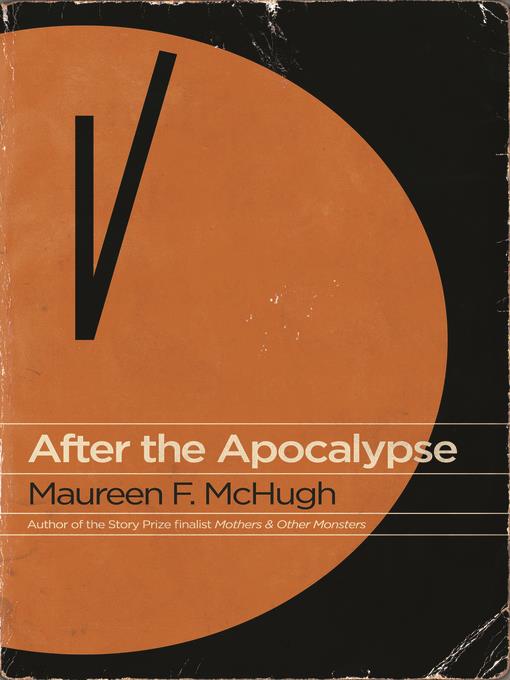
After the Apocalypse
Stories
فرمت کتاب
ebook
تاریخ انتشار
2011
نویسنده
Maureen F. McHughناشر
Small Beer Pressشابک
9781931520355
کتاب های مرتبط
- اطلاعات
- نقد و بررسی
- دیدگاه کاربران
نقد و بررسی

Starred review from August 1, 2011
Hugo-winner McHugh (Mothers and Other Monsters) puts a human face on global disaster in nine fierce, wry, stark, beautiful stories. An impoverished artist in drought-stricken Arizona is reduced to sculpting sex toys in "Useless Things." In a near-future China ravaged by bird flu and capitalism, two young women escape wage slavery with the help of a naïve activist in "Special Economics." A teenage girl trapped in American suburbia grimly watches one of her mothers succumb to a brain-destroying disease carried by processed chicken nuggets in "The Effect of Centrifugal Forces." As McHugh's entirely ordinary characters begin to understand how their lives have been transformed by events far beyond their control, some shrink in horror while others are "matter of fact as a heart attack," but there is no suicidal drama, and the overall effect is optimistic: we may wreck our planet, our economies, and our bodies, but every apocalypse will have an "after" in which people find their own peculiar ways of getting by.

September 15, 2011
All our worst dystopian fears are realized in this grim collection.
McHugh's stories (many previously published in SF and fantasy magazines) depict the many faces of social collapse. Worst-case scenarios abound: bird flu epidemics, dirty bombs, plagues spread by chicken nuggets, Mexican drug cartels and computer systems morphing into something sentient and malign. "The Naturalist" is set in the zombie preserve formerly known as Cleveland, where, during another Supreme Court retrenchment of constitutional protections for prison inmates, convicts are dumped to fend for themselves. The story's protagonist, Cahill, finds he actually enjoys feeding his fellow prisoners to the zombies, like a bemused birder setting out suet. "Special Economics" takes the plight of Chinese factory workers to extreme lengths—they have to moonlight illegally to pay off their ever-mounting debt to their employer. The rather wan "Going to France" loses momentum after a few Francophiles take wing without benefit of aircraft. "The Kingdom of the Blind" is merely tedious, mimicking David Foster Wallace with none of his complexity or humor, and "After the Apocalypse" and "The Naturalist" cover George Saunders territory without his excoriating wit. The stories are more poignant when their premises are less speculative. In "Useless Things," a sculptor living hand to mouth in Albuquerque discovers that the hobo code is now online and that fashioning dildos is a more profitable e-business than creating life-like infant dolls—her life off the grid is dictated by the present-day economy rather than by disaster or pestilence. In "Honeymoon," a woman who narrowly misses settling for marriage to a loser confronts the vagaries of chance when she volunteers for a deadly drug trial. Although an imaginary (for now) food-borne disease is the catalyst for "The Effect of Centrifugal Forces," the real catharsis inheres in the conflicting intentions of Irene, the daughter of an estranged lesbian couple, and her mother's new partner Alice, a hoarder.
An uneven collection whose flashes of profundity are too often doused by dispassion.
(COPYRIGHT (2011) KIRKUS REVIEWS/NIELSEN BUSINESS MEDIA, INC. ALL RIGHTS RESERVED.)

Starred review from October 1, 2011
Like George Saunders (CivilWarLand in Bad Decline, 1996), McHugh displays an uncanny ability to hook into our prevailing end-of-the-world paranoia and feed it back to us in refreshingly original and frequently funny stories. In these nine apocalyptic tales, people facing catastrophes, from a zombie plague to a fatal illness contracted from eating chicken nuggets, do their best to cope. In Useless Things, perhaps the most affecting story in the collection, a resourceful sculptor, worried about drought and money in a time of high unemployment and increasing lawlessness, turns her exquisite crafstmanship to fashioning sex toys and selling them on the Internet with the hope of making enough money to pay her property taxes. In Honeymoon, a participant in a medical trial that goes horribly wrong watches in horror as six men are hospitalzed in critical condition; she uses her payment to take a vacation because, when all was said and done, she wanted to dance. It didn't seem like a bad choice. That survival instinct is what makes McHugh's collection a surprisingly sunny read in spite of the global disasters that threaten at every turn. An imaginative homage to the human ability to endure.(Reprinted with permission of Booklist, copyright 2011, American Library Association.)

























دیدگاه کاربران